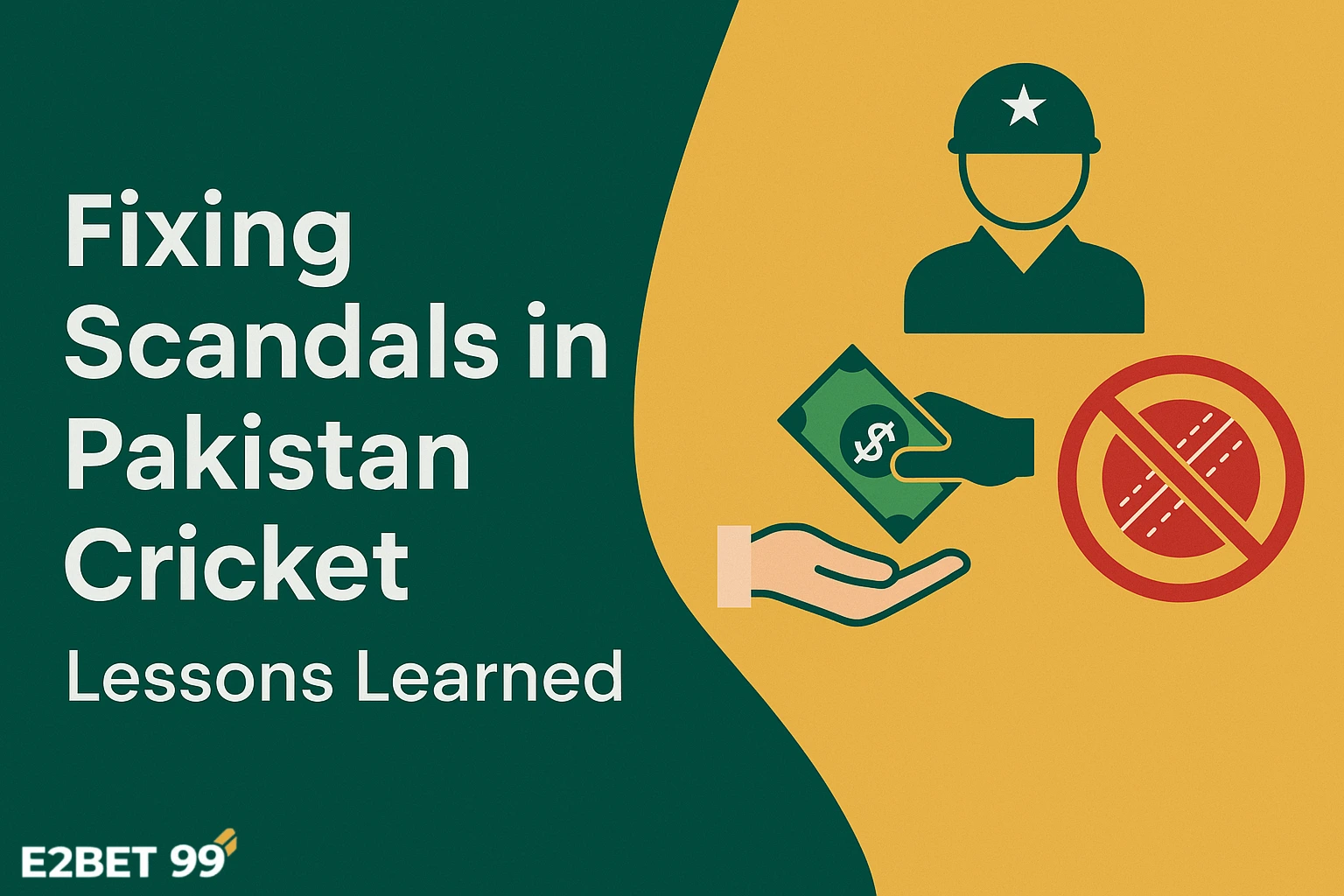Cricket is more than a sport in Pakistan — it’s a passion, a source of national pride, and a uniting force. But when fixing scandals hit the scene, the sport’s spirit takes a heavy blow. Fixing scandals refers to an attempt to manipulate the outcome or specific aspects of a game in exchange for money or favours favours. Pakistan cricket has unfortunately been rocked by several such incidents that not only tarnished the game but also left fans heartbroken. So, what lessons has Pakistan cricket learned from these painful episodes, and how can the future be safeguarded? Let’s dive in.
Understanding the Impact of Fixing Scandals
Fixing scandals shakes the very foundation of cricket. For fans who invest emotions and faith, such scandals breed distrust and disillusionment. Players, especially those involved or accused, often face shattered reputations, which can prematurely end their careers. The Pakistan Cricket Board (PCB) and the entire cricketing ecosystem suffer a blow to credibility, impacting sponsorships, viewership, and international standing. The ripple effects are far-reaching.
Famous Fixing Scandals in Pakistan Cricket
One cannot discuss this topic without recalling the notorious 2010 spot-fixing scandal involving Pakistani players Salman Butt, Mohammad Amir, and Mohammad Asif. Their involvement in deliberately bowling no-balls for betting syndicates sent shockwaves across the cricket world. This scandal led to bans, jail sentences, and a deep introspection for Pakistan cricket.
There have been other episodes as well, though less publicized, revealing a pattern of vulnerabilities exploited by illegal betting groups. Each incident added pressure on PCB to take stricter measures.

Root Causes Behind Fixing
Why do players fall into the trap of fixing? Several factors contribute:
- Financial Pressure: Many players, particularly those not in the national spotlight, struggle with inconsistent pay and uncertain career prospects. This vulnerability makes the allure of quick money all the more tempting.
- Bookies and Betting Syndicates: Illegal networks are sophisticated, offering large sums and sometimes coercing players.
- Weak Governance: Without strong oversight, transparency, and enforcement, fixing can easily thrive underground.
Player Vulnerabilities
Young players, eager to prove themselves, sometimes lack guidance and are susceptible to peer pressure or manipulation by corrupt agents. The absence of a robust mentorship culture leaves them exposed.
Pakistan Cricket Board’s Response
PCB has not taken scandals lightly. Following incidents, the board has:
- Established anti-corruption units aligned with the International Cricket Council (ICC) standards.
- Launched investigations quickly and imposed strict bans and legal action on guilty players.
- Conducted awareness programs to educate players on ethics and risks.
These steps have helped restore some confidence, but they reveal that there’s always room for improvement.
Lessons Learned From Past Scandals
The most important lesson is that prevention is better than cure. Early detection mechanisms, stronger governance structures, and player education are crucial. Anti-corruption workshops are now a regular feature for players at all levels, emphasizing personal responsibility and ethical conduct.
The Role of Education
Through seminars and constant reminders about the consequences of fixing, players are more aware today. Collaboration between PCB and ICC’s Anti-Corruption Unit ensures updated strategies and global best practices are followed.
Technology: A Powerful Ally
Technology is playing a growing role in fighting fixing. Surveillance during matches, data analytics to identify unusual patterns and communication monitoring have become essential tools for detecting and determining suspicious activities.
Fans and Media: Guardians of the Game
Social media has empowered fans to voice concerns and share evidence, making it harder for corrupt practices to go unnoticed. Meanwhile, responsible journalism raises awareness without sensationalizing, creating a balanced narrative that encourages transparency.
Learning From Other Nations
Countries like Australia, England, and India have faced fixing challenges and bounced back by reinforcing anti-corruption protocols, player support systems, and legal frameworks. Pakistan has adopted many of these best practices, but it still has a journey ahead to match the rigour of some established cricket boards.
What More Can Be Done?
Enhancing player welfare through stable contracts and better pay can reduce temptation. Transparency in team selection and clear communication can eliminate doubts and conspiracy theories. Moreover, deeper collaboration with law enforcement agencies to crack down on betting rings will tighten the noose on corruption.
Looking Forward: Building a Culture of Integrity
Pakistan cricket needs to nurture a culture where integrity is celebrated and whistleblowers are protected. Encouraging players and staff to report suspicious behaviour without fear of reprisal is vital. It’s a collective responsibility involving PCB, players, fans, and the entire cricket fraternity.
Conclusion
Fixing scandals have tested Pakistan cricket’s resilience. However, each challenge has taught valuable lessons about governance, transparency, player education, and the role of technology. With continued vigilance, improved player support, and community engagement, Pakistan Cricket can rise above its troubled past and shine as a beacon of fair play and passion.
FAQs
Q1: What triggered fixing scandals in Pakistan cricket?
Financial struggles, illegal betting pressures, and weak governance often created an environment that facilitated attempts to fix the system.
Q2: How does PCB detect fixing attempts?
Through anti-corruption units, surveillance, data analytics, and cooperation with ICC’s Anti-Corruption Unit.
Q3: Are players educated about the risks of corruption?
Yes, regular workshops and seminars are conducted to inform players about the dangers and consequences associated with the game.
Q4: Can fixing scandals be eliminated?
While challenging, strong governance, education, and technology can significantly reduce the frequency of fixing incidents.
Q5: How can fans help in the fight against fixing?
By promoting transparency, reporting suspicious activities responsibly, and supporting clean cricket initiatives.